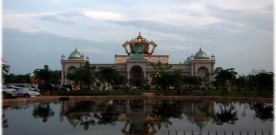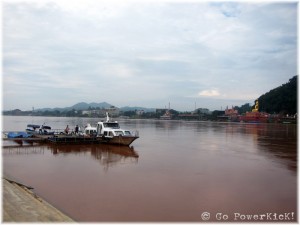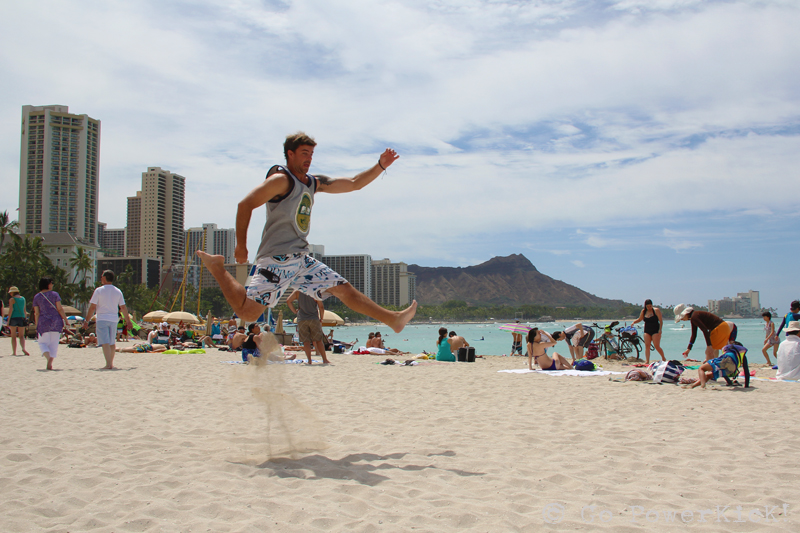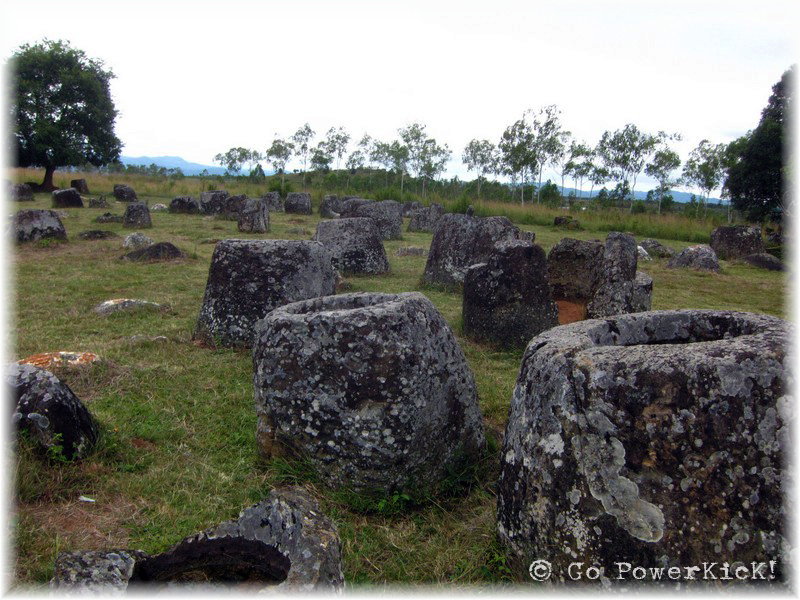Since the 1920’s the Golden Triangle has been the opium-producing capital of the world; 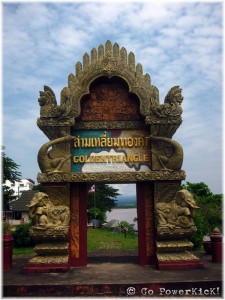 supplying the likes of Europe and the America’s. It gets its name from the area along the Mekong River where three countries, Thailand, Laos and Myanmar (Burma) meet, loosely forming a triangle. Exploring through the area and walking the same paths as some of the world’s most notorious drug kingpins, I stumbled upon a new vice which recently popped up in the Golden Triangle.
supplying the likes of Europe and the America’s. It gets its name from the area along the Mekong River where three countries, Thailand, Laos and Myanmar (Burma) meet, loosely forming a triangle. Exploring through the area and walking the same paths as some of the world’s most notorious drug kingpins, I stumbled upon a new vice which recently popped up in the Golden Triangle.
A worldwide crackdown on the illicit opium trade, which landed most of the main dealers in prison, has seeded the way for new “economies” to develop. Owned by the Chinese, and located in the Golden Triangle Special Economic Zone, the King Roman Group has spent upwards of $450 million dollars developing a casino and the supporting infrastructure situated on the Laos Side of the Mekong River. Welcome to the King Roman Casino.
Arriving at the casino can be slightly tricky as it required monetary compensation on both sides of the Mekong to clear immigration and quasi-legally arrive in Laos without the proper tourist VISA. After surrendering our passports at the Laos immigration a car picked us up and took us to the Casino. Walking up to the mammoth entrance flanked by twin lion statues and passing through the circular doors all sights, sounds and smells were reminiscent of being in Las Vegas. 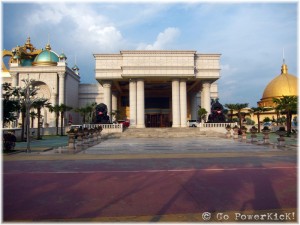 Had I been blindfolded, brought inside the Casino, had the blind fold removed and told I was in Vegas; I would have momentarily concurred….that is until I saw the overwhelming Chinese influence of language, currency and food.
Had I been blindfolded, brought inside the Casino, had the blind fold removed and told I was in Vegas; I would have momentarily concurred….that is until I saw the overwhelming Chinese influence of language, currency and food.
After introductions with the Public Relations desk a tour of the Casino followed. I sadly learned that “Absolutely No Picture” was Casino policy on my attempts to document the experience inside. Leo, the PR tour guide, gave a thorough once-over of the games available to play. Choices were slots (divided into two sections Thai Baht and Chinese RMB), Baccarat, Caribbean Stud Poker, Blackjack and Tiger vs. Dragon. Strolling through the gaming area familiar feelings were beginning to return. I wanted to get in the mix! With not an ATM to be found, I wondered if my Thai Baht would be accepted. I was in luck and had two options. I could play on the Thai tables, which accepted Thai Baht or the cashier in the cage would be happy to accept and convert my Baht in to Chinese RMB. I know there was no currency arbitrage happening behind the cage, yet I decided to keep my Baht and play on the Thai tables.
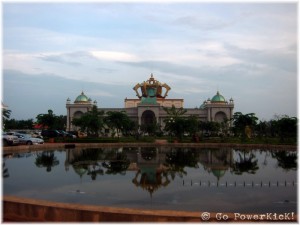 Watching professional Baccarat players taking orders through headsets from gamblers in China helped steer me away from those tables. Seeing no other guests playing Blackjack or Poker, I wanted to go where the action was! Both the Thai tables and the Chinese tables of Tiger vs. Dragon were bustling. With my Thai Baht I chose to play the Thai table. Standing back and watching a few hands I soon figured out that Tiger vs. Dragon was no more than the childhood card game of WAR, only given a more fitting name. I made my way to the table and ponied up a couple thousand Baht. I played my first hand on Tiger, against the cries of the players at the table. When the cards were dealt the Dragon was victorious. On the next couple of hands I decided to switch up my bet and play the Dragon. The cards fell my way and I was a winner! It felt good, and I was back to even. They say “The house always wins,” this held true even at a Chinese casino in Laos. After a few more hands luck was no longer falling on the Dragon and I was cleaned out; it was time to retire from the tables.
Watching professional Baccarat players taking orders through headsets from gamblers in China helped steer me away from those tables. Seeing no other guests playing Blackjack or Poker, I wanted to go where the action was! Both the Thai tables and the Chinese tables of Tiger vs. Dragon were bustling. With my Thai Baht I chose to play the Thai table. Standing back and watching a few hands I soon figured out that Tiger vs. Dragon was no more than the childhood card game of WAR, only given a more fitting name. I made my way to the table and ponied up a couple thousand Baht. I played my first hand on Tiger, against the cries of the players at the table. When the cards were dealt the Dragon was victorious. On the next couple of hands I decided to switch up my bet and play the Dragon. The cards fell my way and I was a winner! It felt good, and I was back to even. They say “The house always wins,” this held true even at a Chinese casino in Laos. After a few more hands luck was no longer falling on the Dragon and I was cleaned out; it was time to retire from the tables.
In a similar practice to Las Vegas the King Roman Casino offered to comp a buffet meal after I 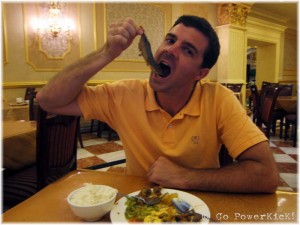 finished up at the tables. The buffet room took on the aura of a 1970’s wedding reception hall, minus the wedding reception. Serving dishes filled one side of the buffet island and all the typical Chinese treats were present. Noodles, rice, pickled vegetables and some fish. I did manage to sneak one photo after Leo the tour guide departed. The food was tasty, and even though I was not successful at the tables I was feeling somewhat like a Whale.
finished up at the tables. The buffet room took on the aura of a 1970’s wedding reception hall, minus the wedding reception. Serving dishes filled one side of the buffet island and all the typical Chinese treats were present. Noodles, rice, pickled vegetables and some fish. I did manage to sneak one photo after Leo the tour guide departed. The food was tasty, and even though I was not successful at the tables I was feeling somewhat like a Whale.
I was curious to see what was around the perimeter of the Casino so after dining at the buffet I strolled out to check the surroundings. I was surprised to see just down the road from the Casino was a gated compound that looked to be where the workers lived. Strolling through, the area quickly took on the traits of a Chinese ghetto in Laos. There was block after block of one story apartments where workers lived and a large cafeteria/kitchen towards the back. An estimated 4,500 people work at the Casino, of which only 500 are Laotians. Situated next to the eatery 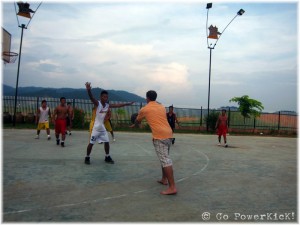 was a basketball court. Peppered with Laker jersey’s and Nike’s, the locals were playing a game of pickup basketball. I kicked off my sandals and motioned to see if they needed one more. After a couple games it was time to head back to the hotel and relax.
was a basketball court. Peppered with Laker jersey’s and Nike’s, the locals were playing a game of pickup basketball. I kicked off my sandals and motioned to see if they needed one more. After a couple games it was time to head back to the hotel and relax.
The trip wrapped up with a ride back to the Laos immigration office to pick up our passports; followed by a speedboat ride across the Mekong back to Thailand. I have to say, the Casino staff, the Laos immigration officers and the King Roman employees who handled our immigration papers were all extremely helpful and went well out of their way to make sure the trip was pleasant with no speed bumps. As the Chinese influence continues to grow over the Southeast Asian region it will be intriguing to watch how the King Roman Casino fairs. With gambling both illegal in Thailand and China, the King Roman Casino should become a popular destination in the future for a prospering middle class emerging in both Thai and Chinese societies. If you find yourself in Northern Thailand and feeling the itch to try your luck; make the journey across the Mekong. Venture into little China and Viva Laos Vegas!
Comments
More Good Reads!

The Best Mai Tai In The World
May 23, 2014
Helicopter Over Oahu
May 10, 2014
Bike The Golden Gate Bridge
April 29, 2014
Hua Hin Hills Vineyard
April 19, 2014
Songkran in Nan
April 10, 2014
How To Spend A Day In Ayutthaya
March 07, 2014
Khlong Lat Mayom Floating Market
February 19, 2014
Khao Ngon Nak: Dragon Crest Mountain
January 28, 2014
Koh Lipe: An Island Paradise
January 14, 2014






